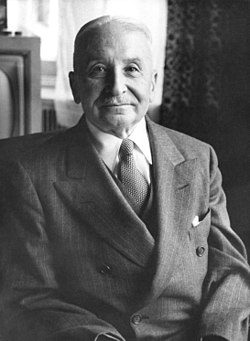Ludwig von Mises Quote
Granted, many of them replied, that socialism may not result in riches for all but rather in a smaller production of wealth; nevertheless the masses will be happier under socialism, because they will share their worries with all their fellow citizens, and there will not be wealthier classes to be envied by poorer ones. The starving and ragged workers of Soviet Russia, they tell us, are a thousand times more joyful than the workers of the West who live under conditions which are luxurious compared to Russian standards; equality in poverty is a more satisfactory state than well-being where there are people who can flaunt more luxuries than the average man.
Granted, many of them replied, that socialism may not result in riches for all but rather in a smaller production of wealth; nevertheless the masses will be happier under socialism, because they will share their worries with all their fellow citizens, and there will not be wealthier classes to be envied by poorer ones. The starving and ragged workers of Soviet Russia, they tell us, are a thousand times more joyful than the workers of the West who live under conditions which are luxurious compared to Russian standards; equality in poverty is a more satisfactory state than well-being where there are people who can flaunt more luxuries than the average man.
Related Quotes
The 10 ever greatest misplacements in life:1. Leadership without character.2. Followership without servant-being.3. Brotherhood without integrity.4. Affluence without wisdom.5. Authority without consc...
When my son speaks of playing sports, I've always told him: playing on the team is great, but aspire to be the guy who owns the team. I've always told my son: most of the guys on the team will end up...
There's poverty in wealth. If a man is wealthy without good health, is he not poor? If a man is wealthy without children, is he not poor? If a man is wealthy without God, is he not poor? If a man is w...
I don't want to be around people who accept me as is, in my unrefined state of becoming. I consistently want people around me who push and encourage me to be my ultimate best, who bring out the inner...
About Ludwig von Mises
In 1940, Mises emigrated from Austria to the United States to escape the Nazis. On the day German forces entered Vienna, they raided his apartment, confiscating his papers and library, which were believed lost or destroyed until rediscovered decades later in Soviet archives. At the time, Mises was living in Geneva, Switzerland. However, with the imminent Nazi occupation of France threatening to isolate Switzerland within Axis-controlled territory, he and his wife fled through France—avoiding German patrols—and reached the United States via Spain and Portugal.
Since the mid-20th century, both libertarian and classical liberal movements, as well as the field of economics as a whole have been strongly influenced by Mises's writings. Mises's student Friedrich Hayek viewed Mises as one of the major figures in the revival of classical liberalism in the post-war era. Hayek's work The Transmission of the Ideals of Freedom (1951) pays high tribute to the influence of Mises in the 20th-century libertarian movement. Economist Tyler Cowen lists his writings as "the most important works of the 20th century" and as "among the most important economics articles, ever". Entire schools of thought trace their origins to Mises's early work, including the development of anarcho-capitalist philosophy through Murray Rothbard and the contemporary Austrian economics program led by scholars such as Peter Boettke at George Mason University.
Mises’s most influential work, Human Action: A Treatise on Economics (1949), laid out his comprehensive theory of praxeology—a deductive, a priori method for understanding human decision-making and economic behavior. Rejecting empirical and mathematical modeling, Mises defended classical liberalism and market coordination as products of rational individual action. Beyond his published works, Mises shaped generations of economists through his longstanding private seminar in Vienna and later as a professor at New York University. His ideas deeply influenced students such as Friedrich Hayek, Murray Rothbard, and Israel Kirzner, who helped inspire the rise of postwar libertarian institutions in the United States, including the Foundation for Economic Education and the Ludwig von Mises Institute.
Mises received many honors throughout the course of his lifetime—honorary doctorates from Grove City College (1957), New York University (1963), and the University of Freiburg (1964) in Germany. His accomplishments were recognized in 1956 by his alma mater, the University of Vienna, when his doctorate was memorialized on its 50th anniversary and "renewed", a European tradition, and in 1962 by the Austrian government. He was also cited in 1969 as "Distinguished Fellow" by the American Economic Association.
